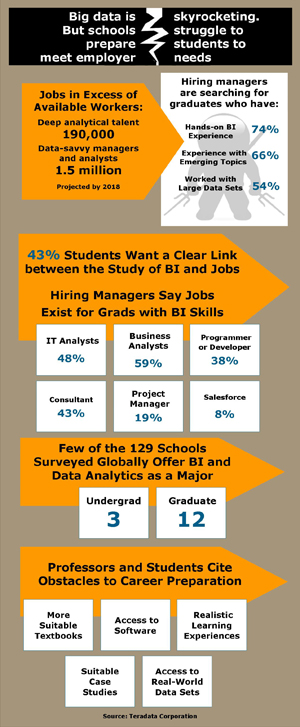
This disconnect between the programs that exist and the needs of the marketplace is leading to a worker shortage that will affect our customers, our partners, our competitors and even ourselves. The worker shortage is only going to increase as more companies use data to their competitive advantage. A McKinsey Global Institute report in May projected that by 2018, the US alone will need an additional 190,000 “deep analytical talent” workers plus 1.5 million more “data-savvy managers and analysts” in excess of available workers.
The BI Congress sponsored the study and its members are already working to help universities change the way they create their BI programs, to make sure the right content is taught and that it is taught within the right context. As an industry, we need to help the BI Congress with the context part of that equation by making curriculum realistic. We can do that by providing large data sets, real-world problems to solve, and case studies.
Editor’s note: Darryl McDonald is an employee of Teradata. Teradata is a sponsor of The Smart Data Collective.
We know that when our customers use BI effectively, it becomes a highly strategic part of their business. It’s how they compete and win. We understand that very success is what makes it difficult for them to provide their masked case studies and business problems, and the sanitized data sets, that students need.
That’s why our Teradata University Network already has processes and mechanisms in place to deliver these fundamental tools, and more than 1200 schools in 85 countries are already taking advantage of them.
One of the findings we didn’t highlight was that a large number of students who have taken at least one BI course find it ‘fun.’ They really like it. That bodes well for whittling down that projected shortage. We can help make their BI education more enjoyable, and make them better prepared at the same time, with more case studies, real-world business problems, and million-row data sets like those already provided by a few of our customers. Business Intelligence is a competitive advantage. But educating tomorrow’s workforce is one area of business where we can, and should, all work together for our mutual benefit.
To learn more about how your organization can support the emerging BI workforce through Teradata University Network, and how you can make your information available, contact: AcademicPrograms.Teradata@Teradata.com
